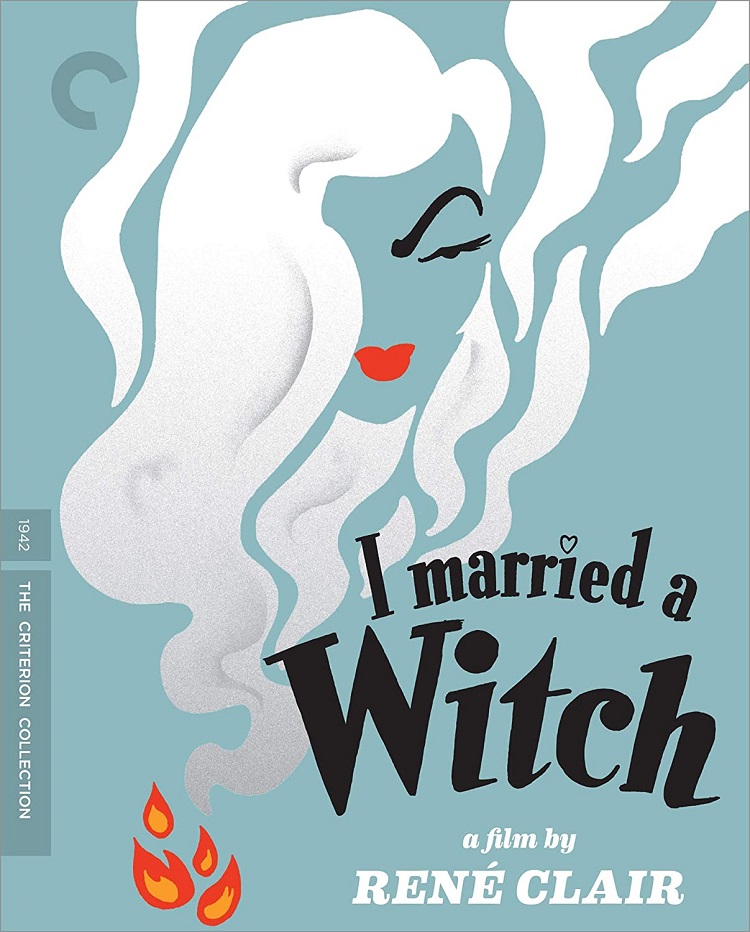
Forget Elizabeth Montgomery in Bewitched; the most beautiful witch of all time is Veronica Lake in I Married a Witch (1942). It has been over 70 years since Rene Clair’s classic screwball comedy provided escapism for a country in the middle of World War II, and the world has changed many times over. Yet, besides that it was filmed in black and white, there is nothing about this movie that feels dated. I Married a Witch is a delight, and has just been released as part of the Criterion Collection.
We open at a Salem witch trial where Clair’s deft comedic touch is immediately apparent. During the “intermission,” we see an obnoxious vendor selling snacks to the assembled crowd. I am sure that this provoked belly-laughs from theatre audiences at the time, and it remains as funny as ever. Beyond the humor, the moment sets up the theme of the movie as much as the actual story, which to this viewer is that some things never change. That is a level of depth I am almost embarrassed to ascribe to it though. I Married a Witch is pure popcorn fun, but what makes it so great is just how smart and hip it is. My only complaint is that it is only 77 minutes long. I could have happily spent another hour with these characters.
Then again, part of the film‘s charm is its fast pace. There is not a wasted moment, even though the story takes a number of unexpected turns. In Salem, a sorcerer named Daniel (Cecil Kellaway) and his daughter/witch Jennifer (Veronica Lake) are burned at the stake. Then an oak tree is planted in the ashes, which will hold their evil spirits in forever. This works for 270 years, until a bolt of lightning strikes the tree and frees them.
A man by the name of Jonathan Wooley (Frederic March) had denounced the two of them, and before the burning, Jennifer cursed him and his descendents to be forever unlucky in love. When the two are released, they decide to check out how the current Wooley heir is doing. It seems that Jennifer’s curse has worked, as Wallace Wooley (Frederic March) is getting ready to marry a shrew of a woman, whose rich newspaper-baron father is promising to get him elected governor. Just for fun, Daniel decides to light The Pilgrim Hotel on fire. Although it is kind of dark, and not really dwelled on in the movie, this is how the disembodied spirits get their bodies. I guess they take over those of people who died in the fire, but again this is never fully explained. They float around as talking wisps of smoke when they are not inhabiting a body.
Jennifer decides to have some fun with Wallace, and has him rescue her from the fire. Her plan is to make him fall in love with her, so he will suffer a lifetime of longing when she rejects him. To make this work, Daniel gives her a glass of water containing a love potion. Jennifer accidentally drinks the water and falls in love with Wallace. The thing is, Jennifer is so fun, quirky, and beautiful that it does not take a potion for Wallace to fall for her, she wins him over anyway.
As I mentioned, there are quite a few unexpected twists and turns, so I think this would be a good place to stop in describing the movie. There are many hilarious bits sprinkled throughout the film. One of the later ones comes when Daniel is in his smoke-form and decides to “hide” in a bottle of whiskey. When he reappears as a man, he is completely drunk, and the cops take him off to jail.
The lone bonus feature on this release is a late ’50s audio recording of Rene Clair from a radio program titled The Film Art, hosted by Gideon Bachmann. In this 20-minute interview piece, Clair talks about the differences between experimental and commercial filmmaking, among other things. It is quite intriguing, despite the fact that it is audio only. As is usually the case with Criterion Collection releases, there is also an informative booklet included.
I took a chance on I Married a Witch just because it sounded so interesting and am very happy I did. Pardon the pun, but the film is magic, in every way. You cannot help but fall in love with it, just as Wallace Wooley did with Jennifer.